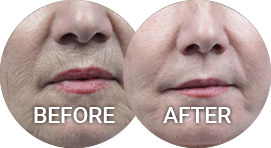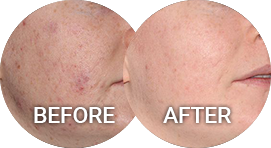Allergies
Conveniently located to serve the areas of Phoenix, AZ

Allergy testing is a medical procedure that helps to identify the specific allergens that trigger allergic reactions. Allergies occur when our immune system reacts to these substances, known as allergens, as if they were harmful.
Allergies can manifest in a spectrum of symptoms, spanning from mild nuisances like sneezing, runny noses, and itchy, watery eyes, to more persistent challenges such as ear infections, chronic headaches, and various skin conditions such as eczema or psoriasis. Inflammation within the body can also be attributed to allergic reactions. At the severe end of the spectrum, individuals may experience life-threatening responses like difficulty breathing and anaphylaxis. Furthermore, allergies have been linked to exacerbating conditions such as sinus infections and upper respiratory infections. Therefore, identifying the specific allergens that cause these reactions is crucial for the effective management and treatment of allergies.
Dr. Kevin Chan and our team at Pineapple Health are experienced in performing various types of allergy tests to help diagnose and treat allergies effectively. We currently use two different forms of testing. Contact our Phoenix office today at (480) 961-2366 or fill out an online form to schedule your consultation with us and start the journey towards effective allergy management.
Take our Allergy Assessment Questionnaire.
Contents
- 1 About Allergies
- 2 Common Allergies
- 3 Allergies: Signs & Symptoms
- 4 Seeing a Doctor About Your Allergies
- 5 Allergy Testing
- 6 Allergy Treatment: Immunotherapy
- 7 Cost of Allergy Treatment in Phoenix
- 8 FAQ
- 8.1 Will my insurance cover allergy testing and treatment?
- 8.2 Why are my allergies getting worse?
- 8.3 How are allergies diagnosed?
- 8.4 What are the treatment options for allergies?
- 8.5 Is immunotherapy only used for environmental allergies?
- 8.6 Can immunotherapy help with asthma?
- 8.7 Can allergies be prevented?
- 9 References
About Allergies
Allergies are among the most common chronic conditions worldwide, with over 100 million sufferers in the United States alone. (1) Research shows that a complex combination of genetics and environmental factors has contributed to a dramatic increase in allergies around the globe, in both developed and developing nations. (2) They affect people of all ages and can occur at any stage of life, although they often start in childhood.
What Are the Most Common Allergens?
The most common allergens include, but are not limited to, the following:
- Pollen
- Dust
- Animal Dander
- Tree Nuts & Peanuts
- Milk
- Eggs
- Crustaceans (Shellfish)
- Fish
- Latex
- Wheat
- Soy
- Sesame Seeds
Common Allergies
Allergic Rhinitis (Hay Fever)
Allergic rhinitis, is a common condition that affects the nasal passages, most frequently developing in a person’s 20s to 40s. (3) It is characterized by:
- Nasal congestion
- Sneezing
- Itchy nose
- Runny nose
- Watery eyes
- Postnasal drip
- Sinus pressure
- Nasal itching
Hay fever is more common in individuals with a family history of allergies and those who live in urban areas with higher levels of environmental pollutants. Allergic rhinitis can be seasonal, occurring during specific times of the year when certain allergens are present, or it can be perennial, persisting year-round due to indoor allergens.
Asthma
Asthma is a chronic condition characterized by inflammation and narrowing of the airways. It affects roughly 8.7% of people in the United States. (4) It typically presents with:
- Recurrent episodes of wheezing
- Shortness of breath
- Coughing
- Chest tightness
Bronchospasm, which is the sudden constriction of the muscles in the walls of the bronchi, is a key feature of asthma. These episodes may occur spontaneously or be triggered by various factors. Allergic asthma is triggered by an allergic reaction to substances such as pollen, dust mites, pet dander, or certain foods. Immunoglobulin E (IgE) antibodies play a significant role in this type of asthma.
Eczema
Eczema, medically referred to as atopic dermatitis, is a prevalent condition that affects the skin, leading to inflammation, itching, and redness. It often presents itself as an eczematous rash and can cause significant discomfort and distress for individuals affected by it. Eczema typically occurs due to a combination of genetic and environmental factors, involving immune system dysfunction and an abnormal response to allergens or irritants. It is most common in children between the ages of 6 and 11. (5)
Food Allergies
An estimated 10.8% of US adults have a food allergy. (6) They occur when the immune system recognizes certain proteins in food as harmful and launches an inappropriate immune response, leading to allergic reactions. Food allergies can cause a wide range of symptoms, from mild to severe, and can affect various organs in the body. They can develop in childhood, or much later in life. The most common food allergies include peanuts, tree nuts, milk, and eggs.
Allergies: Signs & Symptoms
The following signs and symptoms may indicate you have an allergy.
- Hives
- Swelling (Angioedema)
- Redness or Rash
- Sneezing
- Runny or Stuffy Nose
- Watery or Itchy Eyes
- Coughing
- Wheezing or Shortness of Breath
- Difficulty Swallowing
- Nausea or Vomiting
- Abdominal Pain or Cramping
- Diarrhea
- Dizziness or Lightheadedness
- Anaphylaxis (Requires immediate medical attention)
Looking for a primary care physician? See our website for further details!
What is Anaphylaxis?
The world population has a 1% to 3% lifetime prevalence of anaphylaxis. (7) This severe allergic reaction or hypersensitivity reaction, is a life-threatening allergic response that occurs due to an immune system overreaction. This systemic allergic response can result in anaphylactic shock, which is a medical emergency. During an anaphylactic reaction, the immune system releases large amounts of chemicals, notably histamine, which cause widespread inflammation and various symptoms throughout the body. Anaphylaxis can lead to:
- Bronchoconstriction (narrowing of the airways)
- Hypotension (low blood pressure)
- Angioedema (swelling of the skin and underlying tissue)
- Respiratory distress
Seeing a Doctor About Your Allergies
Pineapple Health offers personalized consultations in Phoenix, where we take the time to understand each patient’s unique allergy concerns and medical history. During the consultation, we will perform a thorough evaluation of the symptoms, discuss potential triggers, and recommend appropriate diagnostic tests to identify specific allergens. This comprehensive approach allows for a tailored treatment plan that addresses the underlying causes of worsening allergies.
To schedule a personal consultation with us, simply call Pineapple Health at (480) 961-2366 or fill out our convenient online form. Our friendly staff will assist you in setting up an appointment and answer any questions you may have.
What to expect from your first visit.
Allergy Testing
At Pineapple Health, we provide our patients with accurate and effective allergy diagnosis and management options. One of the key tools in our arsenal is scratch test allergy testing.
Scratch Test
The most commonly used form of allergy testing is the scratch test. It involves exposing the patient’s skin to small amounts of suspected allergens. This test allows healthcare professionals to identify immediate hypersensitivity caused by IgE-mediated responses. During a scratch test, we use what are called test combs. These test combs have a small amount of different environmental antigens on them. The test combs allow us to get the antigens just under the surface of the skin. This allows it to come into direct contact with the immune system cells in the skin. If an individual is allergic to a particular allergen, a localized reaction in the form of a raised wheal or redness may occur within 15-20 minutes.
Blood Testing
We also offer a finger poke test for environmental and dietary allergens. The finger poke test is very simple to perform and takes about 5 minutes. With a simple poke of the finger using a lancet, we collect blood drops from your finger and apply them to a blood card. Once this is complete, we send the card to our lab and they evaluate the environmental and dietary results from the blood.
The primary purpose of this testing system is to identify IGE molecules’ reactivity to environmental and dietary allergens. The higher the class value, the greater the potential risk of an allergic reaction We also look at blocking potential/IGG4. The competition between IGE and IGG4 is then scored. A higher blocking score indicates blocking potential values that may improve the odds of IGG4 molecules neutralizing IGE through competition and prevent allergen-specific adverse reactions from occurring.
Allergy Treatment: Immunotherapy
Immunotherapy is a treatment that helps train the immune system to become less allergic to specific allergens. Our program is focused on treating environmental allergens. It works by exposing the immune system to small amounts of the allergen over time, gradually increasing the dosage. This process desensitizes the immune system, helping it develop a tolerance to the allergen. As a result, the immune system’s response becomes more controlled and less likely to trigger allergic reactions. Immunotherapy can provide long-term relief for patients suffering from allergies, improving their quality of life.
Allergy Injections
Allergy shots involve injecting small quantities of allergens under the skin, typically administered in the upper arm area. The treatment starts with a buildup phase, during which we gradually increase the allergen dosage over several months. Once we reach a maintenance dose, patients continue to receive regular injections for a period of three to five years. Over time, the immune system becomes desensitized to the allergen, resulting in reduced or eliminated allergy symptoms.
Sublingual Immunotherapy
Sublingual immunotherapy (SLIT) involves a spray that goes under the tongue. The allergens are absorbed through the sublingual tissue into the bloodstream. Like allergy shots, SLIT treatment starts with a buildup phase, followed by a maintenance phase. This method is especially suitable for patients who find injections uncomfortable or inconvenient.
Cost of Allergy Treatment in Phoenix
The cost of your allergy treatment depends on various factors, including the specific allergens being targeted, the type of immunotherapy, and the duration of treatment. During your consultation, we will provide a detailed breakdown of the costs involved and tailor a treatment plan that aligns with your needs and financial considerations. Most insurance companies cover Allergy Immunotherapy testing and treatment.
To inquire about allergy testing and allergy treatment at Pineapple Health in Phoenix, call (480) 961-2366 or complete a form on our website to get started.
Please see our website for a list of network insurance providers, and read our blog for more information about allergy testing in Arizona.
FAQ
Will my insurance cover allergy testing and treatment?
Insurance coverage for allergy testing and treatment can vary depending on your insurance policy and provider. Most health insurance plans cover allergy testing and treatment as part of their benefits, while others may require pre-authorization or impose deductibles and copayments. It is important to consult your insurance provider to understand your coverage options and any out-of-pocket expenses that may apply.
Why are my allergies getting worse?
Environmental factors, such as increased exposure to allergens like pollen or year-round exposure to dust mites, can trigger a heightened immune response. Additionally, changes in indoor environments due to air pollution or increased use of carpeting and upholstery can contribute to worsening allergies. Seasonal changes, so-called “allergy season”, mean that fluctuations in pollen and other allergens can also lead to an exacerbation of allergy symptoms. In the state of Arizona, there are two allergy seasons which include springtime and fall, but some patients deal with allergies all year long.
How are allergies diagnosed?
Allergy diagnosis often involves a comprehensive evaluation of symptoms, medical history review, and allergy testing, such as skin prick tests or blood tests, to identify specific allergens.
What are the treatment options for allergies?
Allergy treatment options may include allergy medications (antihistamines, corticosteroids, decongestants), avoidance strategies, immunotherapy (allergy shots), or lifestyle modifications.
Is immunotherapy only used for environmental allergies?
No, immunotherapy can treat various types of allergies, including environmental allergies (pollen, dust mites, etc.), pet allergies, mold allergies, and certain food allergies. The specific allergens targeted during immunotherapy will be determined based on the individual’s allergies.
Can immunotherapy help with asthma?
Yes, immunotherapy can be beneficial for patients with allergic asthma. Allergy treatment can help reduce airway inflammation and improve asthma control in individuals with allergic triggers.
Can allergies be prevented?
While it is not always possible to completely prevent allergies, certain strategies can help minimize exposure to allergens and reduce the severity of allergic reactions. These may include keeping indoor environments clean, using air filtration systems, avoiding known triggers, and following proper medication management.
References
- Ng A, Boersma P. Diagnosed Allergic Conditions in Adults: United States, 2021. Published online January 26, 2023. doi:https://doi.org/10.15620/cdc:122809
- Gutowska-Ślesik J, Samoliński B, Krzych-Fałta E. The increase in allergic conditions based on a review of literature. Advances in Dermatology and Allergology/Postȩpy Dermatologii i Alergologii. 2023;40(1):1. doi:https://doi.org/10.5114/ada.2022.119009
- Akhouri S, House SA. Allergic rhinitis. PubMed. Published July 16, 2023. https://www.ncbi.nlm.nih.gov/books/NBK538186/
- Swed S, Sawaf B, Al-Obeidat F, et al. Asthma prevalence among United States population insights from NHANES data analysis. Scientific Reports. 2024;14(1):8059. doi:https://doi.org/10.1038/s41598-024-58429-5
- More Than a Quarter of U.S. Adults and Children Have at Least One Allergy. www.cdc.gov. Published January 27, 2023. https://www.cdc.gov/nchs/pressroom/nchs_press_releases/2022/20220126.htm
- Gupta RS, Warren CM, Smith BM, et al. Prevalence and Severity of Food Allergies Among US Adults. JAMA Network Open. 2019;2(1):e185630. doi:https://doi.org/10.1001/jamanetworkopen.2018.5630
- McLendon K, Sternard BT. Anaphylaxis. National Library of Medicine. Published January 26, 2023. https://www.ncbi.nlm.nih.gov/books/NBK482124/




